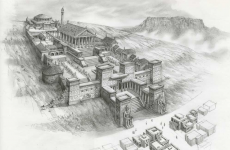
The Library of Alexandria. One of the greatest collections of knowledge in all of human history, and arguably the most significant library of the ancient world. It is said to have possessed nearly half a million scrolls, from its birth in 300 BCE, to its destruction in 30 BCE. The building contained the documentation of the history of the ancient empires surrounding it, such as Egypt and Rome, theories of mathematics, astronomy, physics and natural sciences, all in multiple languages. One of the most prolific stores of human history, specifically of the ancient world, ever to exist, and a casket of knowledge which would most certainly be considered a gold mine for historians. However, whilst our knowledge on the ancient world is considerably great, it is not as nearly as vast as the contents of this library would suggest. How could this possibly be?
The answer is devastatingly simple. It was destroyed. The most notable collection of human history of its time, was burnt down. Ancient works, which only existed in a single copy, were taken from the public, leaving an unforgiveable gap in the knowledge of historians today, (as well as the removal of free information from the public at the time of the library’s destruction). Although the Roman Empire certainly made contributions which were significant to the advancement of humanity, in this case, we can consider them to be ‘the bad guys.’ There is some dispute over which individual event caused the destruction of the great library. One possibility is Caesar’s attack of Alexandria in 48 BCE, where, apparently, the fire of the Alexandrian docks set by the Romans accidentally spread to the building. Although, some claim this may have been deliberate. Whichever the correct explanation, over the next 18 years, the devastation of one of the greatest stores of human knowledge continued. This left modern society without a notably great source of information.
Whether this obliteration of knowledge was accidental or not, is a reflection of what is occurring in the world today. In North Korea, for example, all media outlets are strictly owned and controlled by the government, every piece of media in the country receiving its news from the same station; The Korean Central News Agency, which dedicates itself towards political propaganda, rather than the spread of actual knowledge. In Burma, authorities filter emails and block access to websites which criticize the government. In Cuba, Internet access is only permitted at government controlled access points, and in Iran and Syria, bloggers can be arrested for writing the ‘wrong’ things. Suppression of human knowledge exists throughout our modern world, and it is as morally disgusting as the burning of scrolls, and the prevention of sharing information.
Article 19 in the universal declaration of human rights states that everyone has the right to seek, receive and impart information. Article 26 states that everyone has a right to an education. The growth of knowlegde is undoubtedly a beautiful thing. The destruction of any form of human information, which is what the devastation of the Library of Alexandria has come to represent, is certainly, therefore, a terrible thing.

0 Comment:
Be the first one to comment on this article.